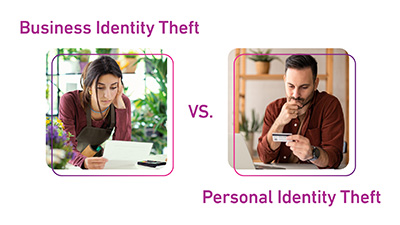Identity theft is no longer a problem exclusive to individuals. Small businesses are increasingly becoming targets for fraudsters, leading to devastating financial and reputational consequences. If your business becomes a victim of identity theft, it’s crucial to act swiftly and effectively to mitigate damage and prevent future incidents. In this blog post, we’ll explore what business identity theft entails, the common tactics fraudsters use, signs that your business may be compromised, and the steps you can take both immediately and in the long term to protect your business.
How Business Identity Theft Differs from Personal Identity Theft
While personal identity theft affects individuals by misusing their social security numbers, credit card information, and personal details, business identity theft targets the assets and reputation of a company. Personal identity theft is often quickly identified through anomalies in personal financial statements. In contrast, business identity theft may take longer to discover, often only becoming apparent after significant damage has occurred.
Understanding Business Identity Theft
Business identity theft involves the unauthorized use of a company’s credentials, such as its tax identification number, business license, or credit information, to fraudulently obtain goods, services, or credit. This information is typically sold on the Dark Web by fraudsters.
If your business identity has become compromised through a data breach or inside actor, fraudsters will use the info, sometimes referred to as “Business Fullz” to apply for various forms of business credit.
Another tactic fraudsters will employ is to use Secretary of State websites to find dormant or inactive businesses, pay the state to re-activate the previously incorporated business to be in good standing with the state, then use this information at some point to apply for credit. For those entrepreneurs who may have voluntarily closed a business, they can still be exposed to identity theft.
Unlike personal identity theft, business identity theft can be more challenging to detect and resolve due to the complexity of business operations and financial dealings.
A Drag on Small Business Growth
The problem can also dampen small business growth. Some financial institutions are reluctant to introduce small business funding products, because of the elevated number of fraudulent applications, and a low confidence level in identifying fraud in the loan onboarding stage. Several Experian clients in the financial services sector have expressed hesitancy toward growth, particularly during these high interest rate times.
The Growing Threat of Business Identity Theft
To put the problem into perspective — according to Javelin, consumer identity fraud losses amounted to nearly $23 billion in 2023, resulting in a 13% increase in overall losses for U.S. adult victims of identity fraud, and since business owners are also consumers, it’s a problem that doesn’t discriminate between an individual or the business they may own.
Over the past decade, the incidence of business identity theft has risen alarmingly. As more companies digitize their operations and conduct business online, they inadvertently expose themselves to greater risks. Advances in technology have enabled cybercriminals to execute more sophisticated schemes, leading to a surge in reported cases. These businesses often lack the robust security infrastructure that larger corporations possess, making them attractive targets for fraudsters.
The rapid rise in business identity theft means business owners and their employees need to take an active, all-hands-on-deck approach in safeguarding the business and its valuable assets and sensitive information. It’s the new normal.
Potential Consequences for Victims of Business Identity Theft
The consequences of business identity theft are far-reaching:
• Financial Loss: Fraudulent transactions can drain bank accounts and incur massive debts in the company’s name.
• Reputation Damage: Trust built with clients, suppliers, and partners can be eroded, causing long-term business relationships to suffer.
• Legal Issues: Businesses may face legal action if they fail to protect sensitive information, leading to lawsuits and regulatory penalties.
Common Tactics Used to Steal Identities
Fraudsters employ various sophisticated tactics to steal business identities. Understanding these common methods can help businesses recognize and respond to potential threats more effectively. Below, we explore several prevalent techniques cybercriminals use to target businesses and compromise sensitive information.
- Phishing and Spear-Phishing Attacks
Phishing involves sending deceptive emails to trick recipients into providing sensitive information. Spear-phishing is more targeted, often personalized to increase the likelihood of success. Both methods can lead to unauthorized access to business accounts and sensitive data. - Fake Invoices and Fraudulent Vendor Accounts
Fraudsters may create fake invoices or set up fraudulent vendor accounts to siphon money from unsuspecting businesses. These schemes can be difficult to detect, especially in companies with high volumes of transactions. - Data Breaches and Hacking
Cybercriminals exploit vulnerabilities in software and network systems to gain unauthorized access to business data. These breaches can compromise sensitive information, including customer details, financial records, and proprietary business information.
- Social Engineering and Impersonation
Social engineering involves manipulating individuals into divulging confidential information. Fraudsters may impersonate employees, executives, or trusted partners to gain access to sensitive information or financial resources. - Business Email Compromise (BEC)
BEC schemes involve fraudsters gaining control over a business email account to conduct unauthorized transactions. These attacks often result in significant financial loss and can be challenging to detect and resolve.
How Experian Can Help To Protect Your Business Identity
Experian works with lenders to identify Business Identity theft; here are ways to protect your business.
First, be proactive by staying alert. Use a credible monitoring service like Experian’s Business Credit Advantage to notify you of changed items inside your business credit profile that could indicate suspicious activity and information that has been compromised on the Dark Web. Then, pay close attention to the alert notifications you receive. Take action to investigate any suspicious activity. Experian provides services to help investigate and restore your business credit.
If your business does fall victim to fraud, take the extra precautionary step of placing a fraud notice on your business credit file for lenders to contact owner before extending credit. This is a free service offered free of charge by Experian.
Signs Your Business May Be a Victim of Identity Theft
Detecting business identity theft early is crucial to mitigating its impact and preventing further damage. By being aware of the warning signs, businesses can quickly address potential breaches. This section highlights key indicators that your business may be a victim of identity theft, helping you to recognize suspicious activities and respond appropriately to protect your company’s assets and reputation.
- Unexplained Changes in Business Records
Sudden, unexplained changes in your business records, such as updated contact information, new accounts, or unauthorized transactions, can indicate identity theft. Regularly monitoring your business records can help detect these changes early. - Sudden Drop in Credit Score
A sudden drop in your business credit score without a clear reason could be a sign of fraudulent activity. It is essential to monitor your business credit score regularly to identify any suspicious change - Receipt of Invoices for Goods/Services Not Ordered
Receiving invoices for goods or services that your business did not order can be a red flag for identity theft. These fraudulent invoices may be part of schemes to siphon money from your business.
- Alerts from Financial Institutions or Creditors
Financial institutions and creditors may alert you to suspicious activities, such as unauthorized transactions, new accounts, or unusual spending patterns. Pay close attention to these alerts and investigate any anomalies promptly. - Suspicious Emails or Communications
Unusual or suspicious emails and communications, especially those requesting sensitive information or financial transactions, should be treated with caution. Verify the authenticity of such communications before taking any action.
Immediate Steps to Take If Your Business Is a Victim of Identity Theft
- Secure Your Systems and Data
Immediately secure your systems and data by changing passwords, updating security protocols, and implementing stronger cybersecurity measures. Ensure that all software and systems are up-to-date and protected against potential threats. - Notify Your Financial Institutions and Creditors
Contact your financial institutions and creditors to report the identity theft and halt any unauthorized transactions. They can help you secure your accounts and prevent further fraudulent activity. - Report to Relevant Authorities
Report the identity theft to relevant authorities, such as the police, the Federal Trade Commission (FTC), and local government agencies. This helps initiate an official investigation and provides a record of the incident.
- Inform Your Business Partners and Customers
Notify your business partners and customers about the data breach to maintain transparency and trust. Provide them with information on how to protect themselves and their data. - Monitor Your Business Accounts and Credit Reports
Continuously monitor your business credit reports and accounts for any suspicious activity. Regularly review transactions and financial statements to detect and address any unauthorized activities promptly. Experian offers a business monitoring service called Business Credit Advantage. The annual service provides unlimited access to an owner’s business credit report, daily monitoring by Experian, change alerts and Dark Web surveillance
Long-Term Strategies for Recovery and Prevention
Strengthen Cybersecurity Measures
Invest in robust cybersecurity measures to protect your business from future attacks. Implement firewalls, antivirus software, encryption, and multi-factor authentication to enhance your security posture.
Implement Employee Training Programs on Security Awareness
Educate your employees about security best practices and the importance of safeguarding sensitive information. Regular training programs can help prevent social engineering attacks and reduce the risk of human error.
Regularly Review and Update Security Policies
Review and update your security policies regularly to ensure they align with current best practices and emerging threats. Keep your team informed about any changes and ensure they adhere to the updated protocols.
Monitor Activity on Your Business with Credit Bureaus
Regularly monitor your business credit profile with credit bureaus to detect any suspicious activity early. Services like Experian’s Business Credit Advantage provide daily monitoring and alerts to help you stay informed.
Conduct Regular Audits and Risk Assessments
Conduct regular audits and risk assessments to identify vulnerabilities and address potential security gaps. Regular evaluations can help you stay ahead of emerging threats and protect your business from identity theft.
Conclusion
Business identity theft is a serious threat that requires swift and effective action. By understanding the tactics fraudsters use, recognizing the signs of identity theft, and implementing immediate and long-term strategies, you can protect your business from potential harm. Stay vigilant, proactive, and committed to safeguarding your business’s identity and reputation. For peace of mind, consider using services like Experian’s Business Credit Advantage, which offers daily monitoring and alerts to keep your business secure. Together, we can build a safer environment for businesses to thrive.
If you would like to learn more about the problem of commercial fraud and how to mitigate it successfully, consider these additional resources:
• Mitigating application fraud: the rise of SMBs and commercial loan fraud
• Account takeover fraud in lending services: key risk management considerations
• Identity fraud in commercial applications: Experian Business Chat
• View what business owners are saying about how Experian helps them protect their business
By incorporating these strategies and staying informed, you can protect your business from the damaging effects of identity theft. If you need further assistance or want to learn more about safeguarding your business, reach out to Experian.





